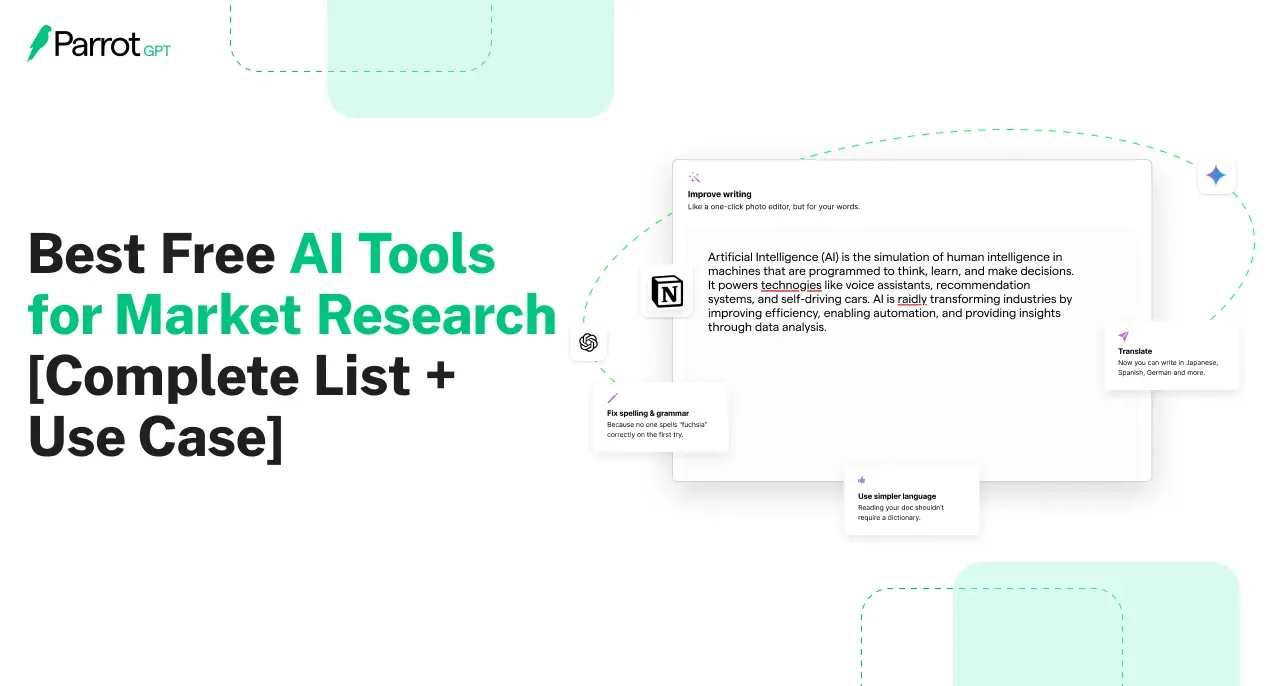Introduction
“86% of businesses say AI is becoming a mainstream part of their market research.”
AI has completely reshaped the landscape of market research, enabling businesses to make data-driven decisions faster and more accurately. From uncovering customer insights to predicting trends, AI tools are the cornerstone of modern research strategies.
But it’s not just about having access to AI—it’s about using the right free AI tools for market research that make a real impact without costing a dime.
So, in this blog, we’ll explore:
- Top free AI tools to enhance your market research
- Practical use cases and how businesses are leveraging them
- How to implement these tools in your workflow
Ready to dive into how these free AI market research tools can transform your research process? Let’s get started.
Why Use AI for Market Research in 2025?
AI is already reshaping how businesses understand their markets. And we’re just getting started.
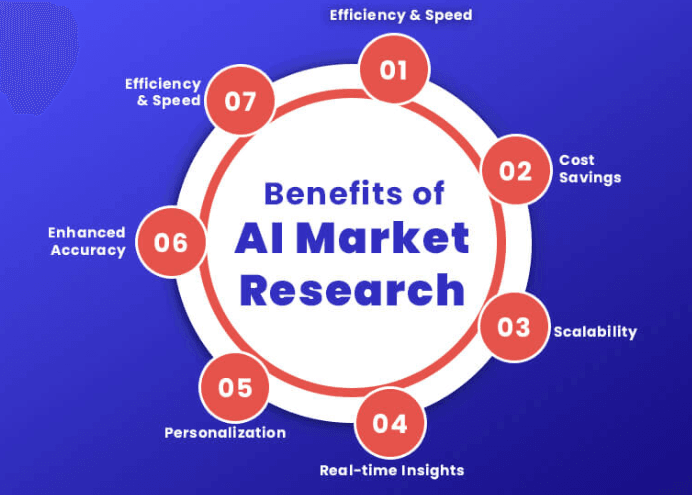
Before we dive into the free AI tools for market research you can use, it’s worth asking why AI has become such a game-changer.
In the past, market research meant days or weeks of sifting through raw data, often with limited scope and slow turnaround. Today, AI tools turn that process into minutes, with broader coverage and far better accuracy.
Instead of guessing what your audience wants, these tools predict it. Instead of searching for trends manually, they surface them in real time.
More importantly, this shift levels the playing field. Market research AI tools free up resources for small businesses and solo marketers, letting them make informed decisions without the need for expensive consultants or in-house analysts.
Using the best free AI tools for market research can help even lean teams act fast, pivot smartly, and compete confidently, no matter their size or budget.
Top 10 Free AI Market Research Tools (With Use Cases)
With AI now central to speed, accuracy, and scale in research, the next step is choosing the right tools, especially if you’re working with limited resources. Thankfully, free AI market research tools today can rival premium platforms in functionality.
This section breaks down real, free tools that small teams can start using right away. Each one includes core features, practical use cases, and exactly how to get started.
Let’s begin with one of the most versatile picks.
1. ChatGPT (Free Version)
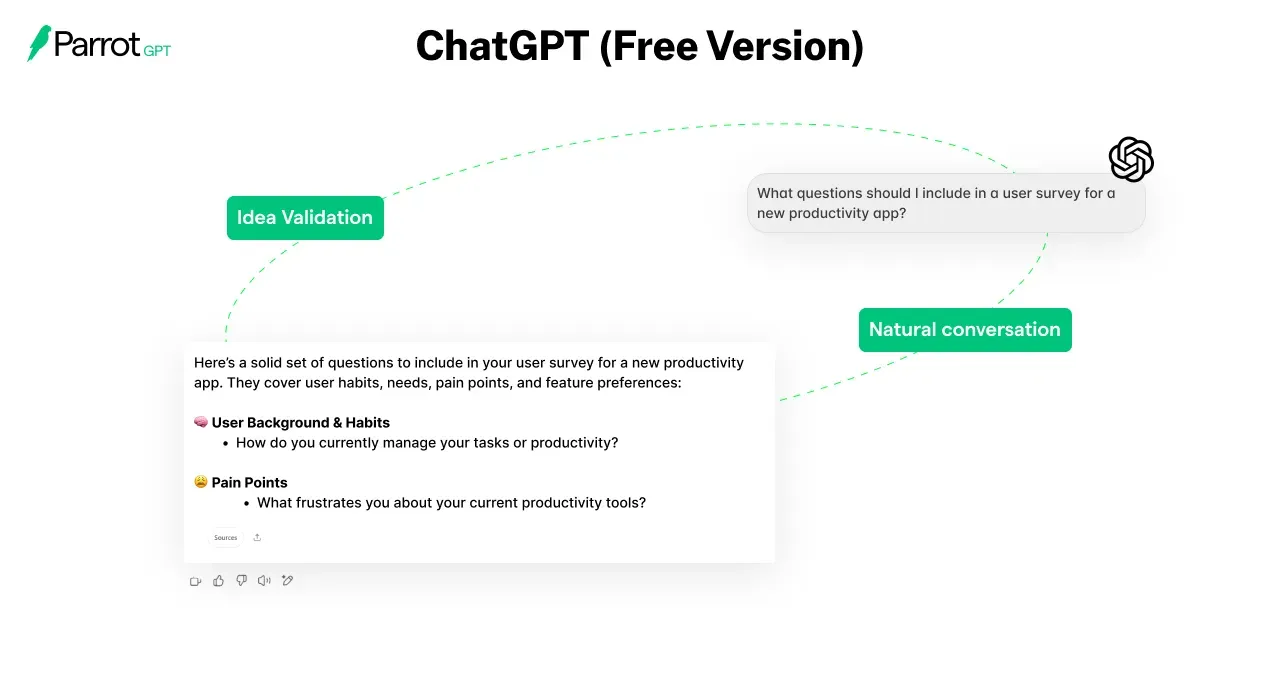
ChatGPT’s free version is surprisingly powerful for early-stage research. It helps solo marketers and small teams turn raw information into structured insights, fast, without needing complex dashboards or paid tools.
Key Features
- Natural conversation-style answers
- Great for brainstorming, summarizing, and idea validation
Use Cases
- Summarizing long-form content like articles or market reports
- Running a quick SWOT analysis on competitors
- Creating survey questions for user research
- Uncovering customer pain points via prompt-driven exploration
- Drafting basic customer personas based on niche queries
How to Use
Use prompt-based conversations to get structured responses. You can refine results through follow-ups and even chain questions for deeper analysis. For example:
- “Summarize this report on Gen Z consumer behavior in three bullet points.”
- “Give me a SWOT analysis of [Competitor Name] in the online grocery space.”
- “What questions should I include in a user survey for a new productivity app?”
Chaining responses helps simulate analyst-level thinking. You can also use it to outline reports or simplify dense findings for stakeholders.
Whether you’re testing early-stage ideas or validating insights, using the best free AI tools for market research like ChatGPT can seriously boost both your speed and clarity, without spending a dime.
2. Google Bard (Gemini)
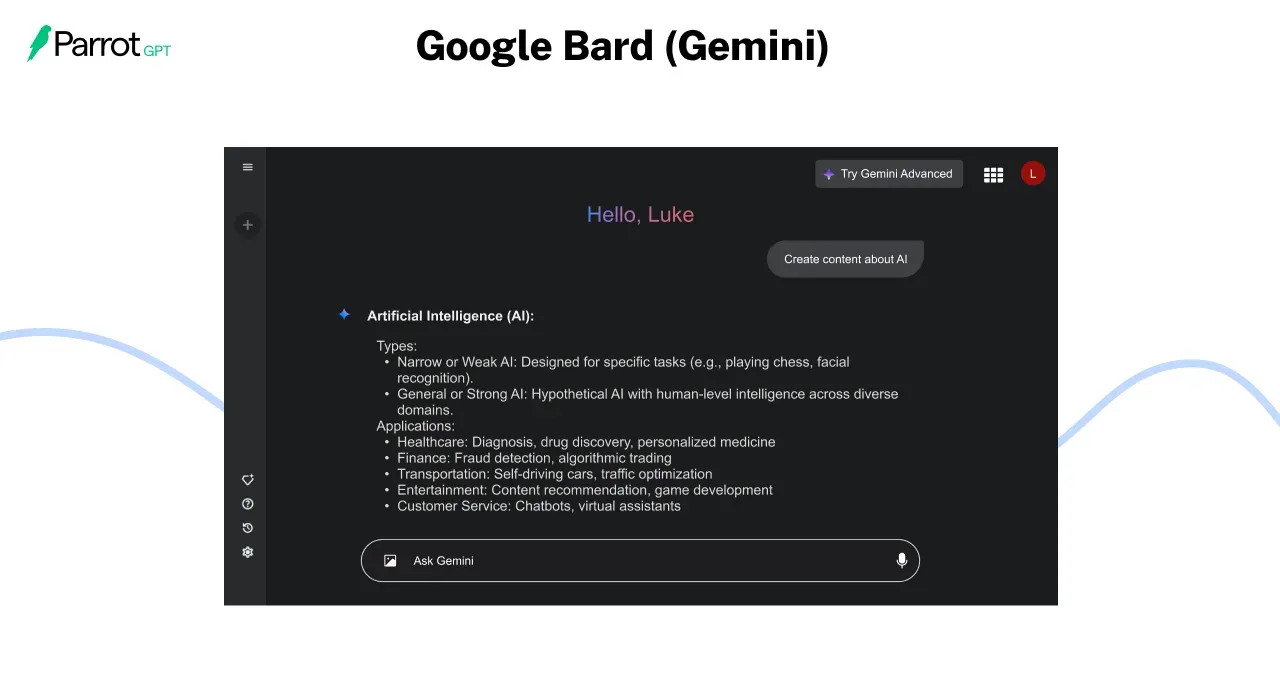
Google Bard (Gemini) is one of the best free AI tools for market research, offering live web search integration for real-time insights.
With fast response times and automatic citations, it's an excellent tool for anyone needing up-to-date market intelligence.
Key Features
- Connected to live web search
- Fast response time with citations
Use Cases
- Checking competitor pages for fresh updates
- Summarizing industry blogs and news articles
- Comparing different market offerings and products
- Getting real-time trend information and updates
- Exploring customer preferences and sentiment
How to Use
Google Bard is most useful when you're looking for live, up-to-the-minute information. For example, you can use the “Google it” feature to get the latest insights on specific market trends.
When comparing products, you could ask Bard, “Compare the latest features of Samsung Galaxy S23 vs. Apple iPhone 15.” This will give you a detailed comparison based on real-time web data. For trend analysis, try asking, “What are the most popular trends in digital marketing for 2025?”
Google Bard helps those seeking free market research AI tools by streamlining the process of gathering information without a complicated setup.
3. Perplexity AI
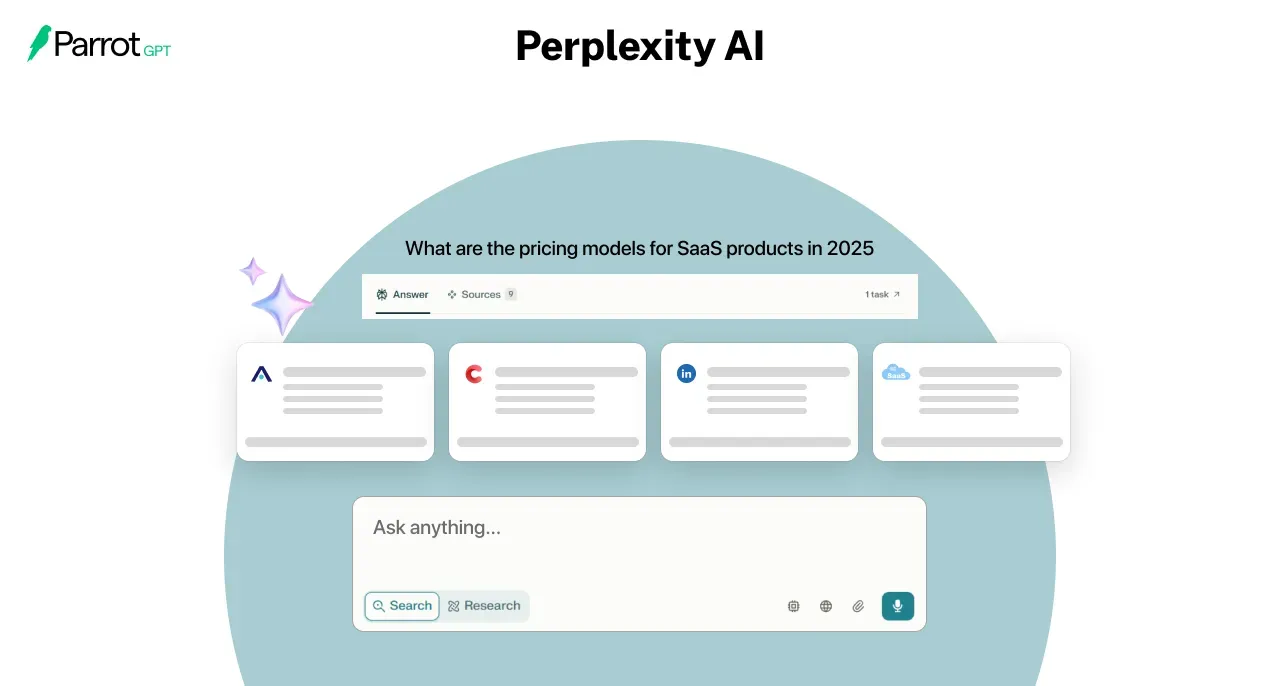
Perplexity AI has quickly become a favorite among free AI market research tools, especially for users who want credible, source-backed answers fast.
Its strength lies in its ability to pull verified insights from across the web, paired with citations you can click to explore deeper.
Key Features
- Sources and citations are always visible
- Supports follow-up questions for layered research
Use Cases
- Finding detailed market research reports
- Citing expert-backed data in presentations
- Comparing pricing models across industries
- Pulling audience insights from Reddit or Quora threads
- Getting reliable answers for niche market questions
How to Use
To get the most from Perplexity, use the Pro tab for longer-form answers (still free). This mode adds depth to your queries while maintaining access to source links.
For example, you can ask, “What are the pricing models for SaaS products in 2025?” or “What are the pain points of first-time homebuyers on Reddit?” Each response includes clickable citations, letting you verify or expand your findings.
Whether you're validating market trends or crafting audience personas, Perplexity helps position your research at par with larger teams, making it one of the best free AI tools for market research today.
4. Google Trends
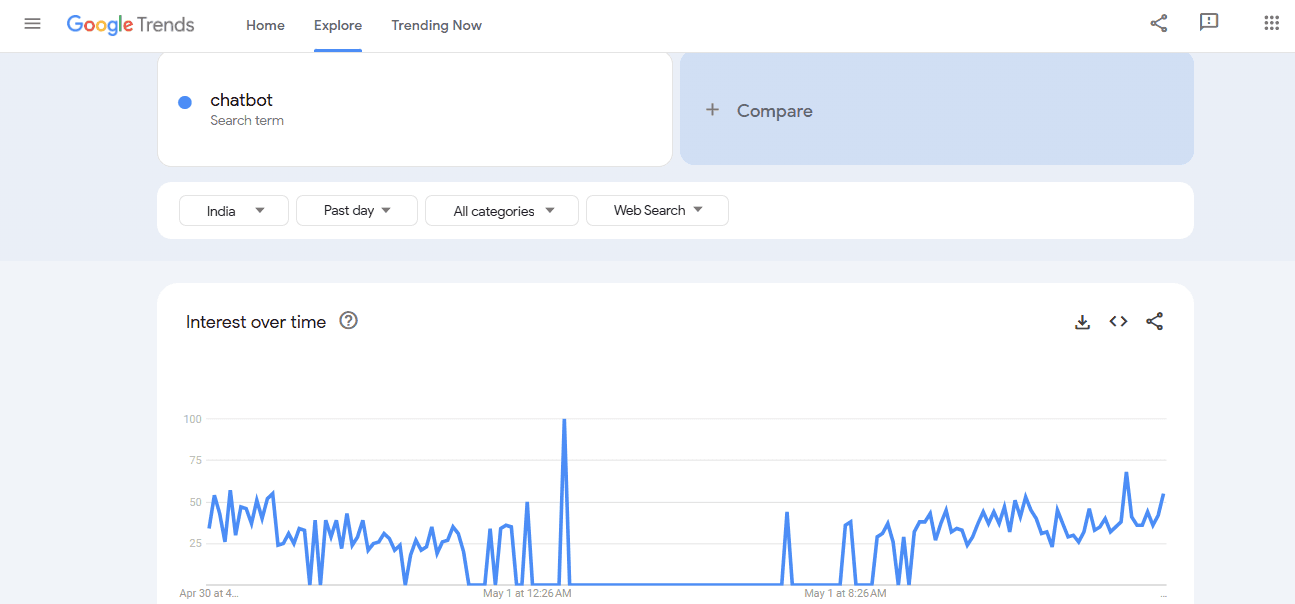
Among the free AI tools for market research, Google Trends stands out for helping teams stay ahead of shifting consumer interest, especially when speed and timing matter most.
It’s built for spotting what’s gaining traction in real time, which is critical for marketers, creators, and product teams planning launches or campaigns.
Key Features
- 100% free access to real-time trend charts
- Filters by location, timeframe, and category
Use Cases
- Choosing the right time to launch a product
- Tracking seasonal demand fluctuations
- Validating niche interests before investing
- Comparing brand interest across competitors
- Spotting fast-rising keywords early
How to Use
Start by entering multiple search terms in the Google Trends search bar to compare their popularity over time. For example, compare terms like "sustainable fashion" versus "eco-friendly clothing."
You can filter results by region and timeframe, allowing you to focus on trends specific to your market. Use the "related queries" feature to find alternative search terms or explore rising trends.
Once you've gathered your insights, export charts directly to use in reports or presentations. This is especially helpful when showcasing demand shifts or planning product launches.
With no cost and a simple interface, Google Trends remains one of the most reliable free market research AI tools for identifying when and where to act on emerging demand.
5. AnswerThePublic
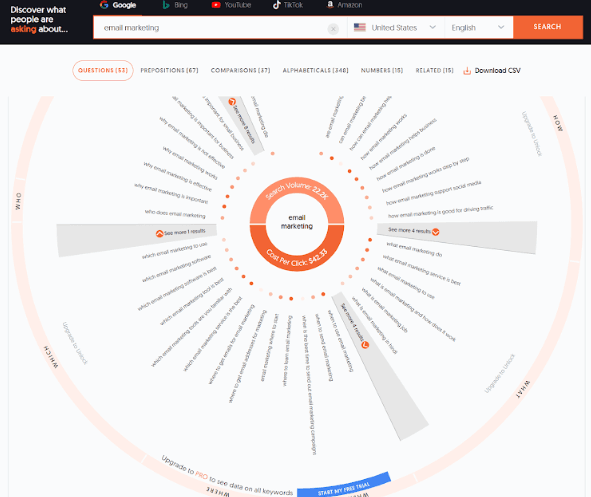
This AI tool transforms raw search data into something visual, insightful, and immediately actionable.
As one of the most intuitive free AI market research tools, it helps uncover what people are genuinely curious about, making it perfect for content strategy and early-stage product validation.
Key Features
- Visual map of search questions
- Based on real Google autocomplete data
Use Cases
- Discovering customer questions
- Identifying content gaps
- Mapping user journey stages
- Testing messaging angles
- Validating product-market fit
How to Use
Begin by typing a broad keyword related to your niche, such as “freelance writing” or “vegan skincare.”
The platform instantly generates a visual wheel of related questions, comparisons, and prepositions that real users are searching for.
You can filter results by location or language for more localized research. Focus especially on the “prepositions” and “comparisons” sections; they often reveal intent-driven queries that are gold for campaign messaging and blog content.
Exporting results to CSV is also handy for clustering and analysis.
6. Ubersuggest (Free Tier)
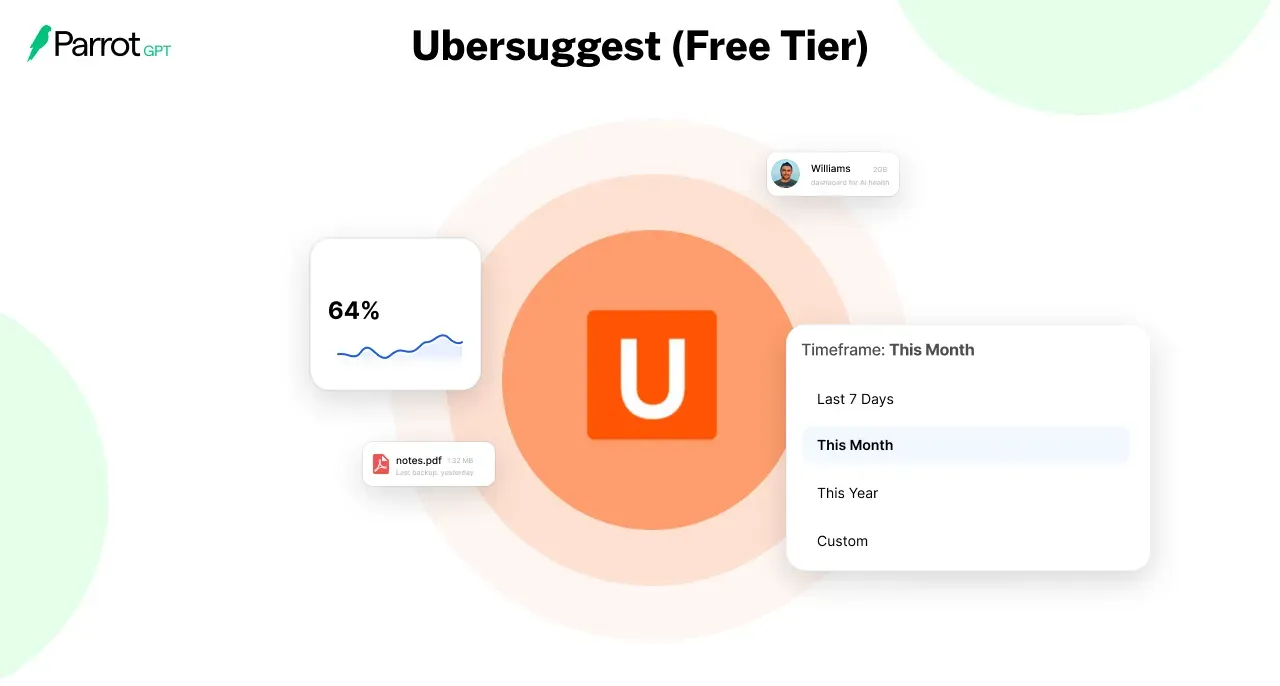
Ubersuggest makes it easier for small marketing teams to tap into SEO and traffic data without paying for expensive tools.
As one of the more generous free market research AI tools, its keyword and domain-level insights help bridge content gaps fast.
Key Features
- Keyword research + domain insights
- SEO audit features
Use Cases
- Discovering content gaps
- Identifying trending keywords
- Checking competitor organic traffic
- Researching backlink opportunities
- Estimating content performance
How to Use
Start by entering a broad keyword like “eco-friendly packaging” or a competitor domain.
Focus on the Keyword Ideas tab to find high-volume, low-competition terms. For content research, head to the Content Ideas section to view popular articles tied to your topic—note engagement metrics like backlinks and social shares.
If you’re exploring backlink strategies or validating a content gap, run a quick Site Audit to spot SEO issues or check the Backlinks tab for linking domains.
The free version gives three searches daily, so prioritize your focus.
7. AlsoAsked
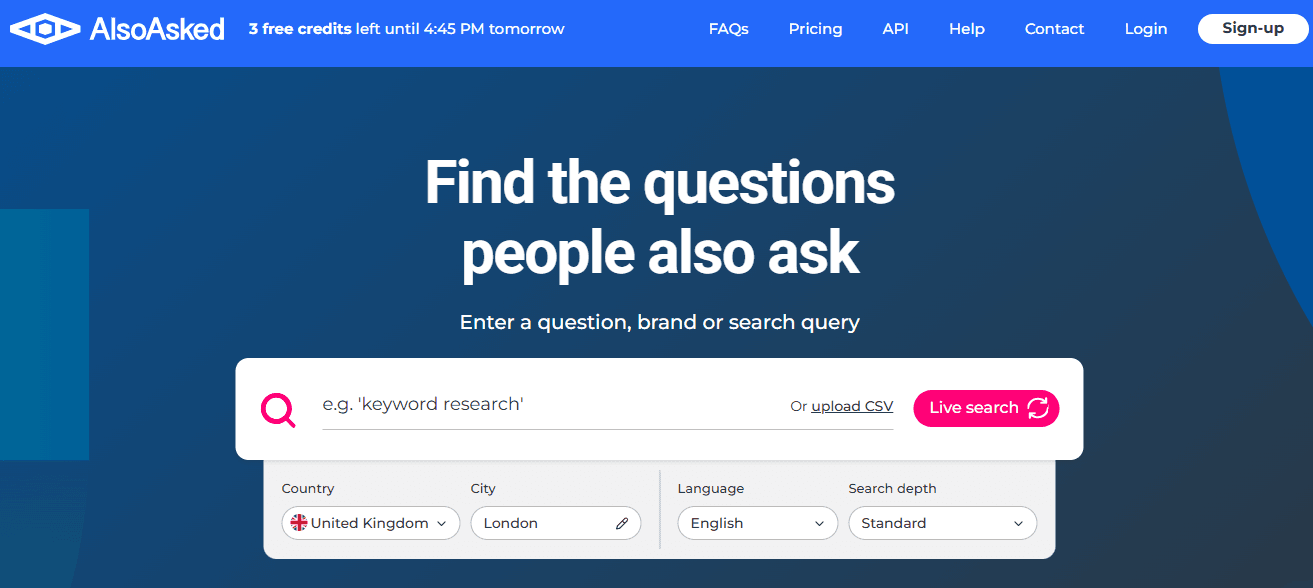
Among the best free AI tools for market research, AlsoAsked turns real Google queries into structured visual maps.
It's ideal for marketers building topic clusters or FAQs backed by actual user intent.
Key Features
- Generates maps from Google's “People Also Ask” results
- Visual hierarchy helps explore topic depth and subtopics
Use Cases
- Discovering long-tail search queries
- Creating educational blog series
- Structuring FAQ pages
- Mapping user intent through the buyer journey
- Identifying new content opportunities
How to Use
Start with a broad keyword—say “sustainable fashion” or “AI in healthcare.”
AlsoAsked will return a visual map of related questions pulled from Google’s “People Also Ask.”
For example, with “sustainable fashion,” you might get follow-ups like:
- “Why is sustainable fashion important?”
- “How do I find eco-friendly clothing brands?”
Use these question branches to shape an FAQ page, blog series, or even a webinar outline.
Filter results by region to localize insights, and export the map to keep your content planning visual and structured.
8. Notion AI (Free Tier)
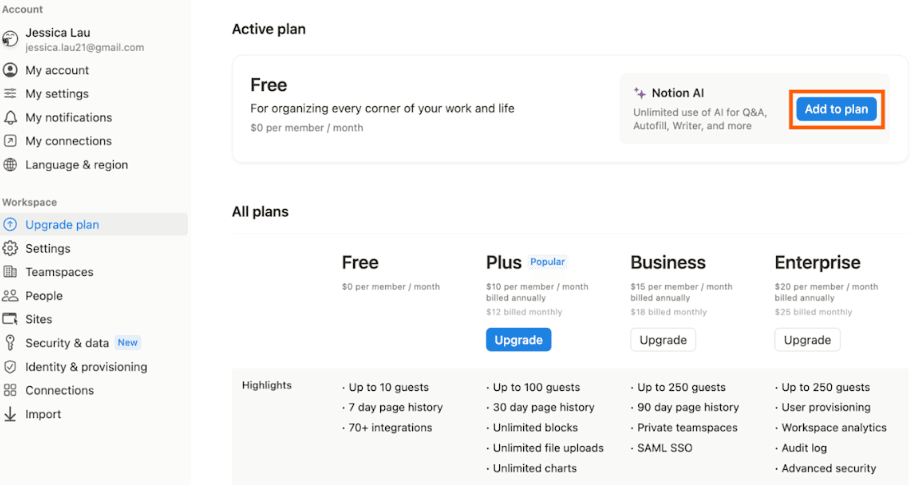
Notion AI blends writing, planning, and light research into one seamless workspace.
As one of the more flexible free AI tools for market research, it’s ideal for small teams looking to combine ideation and documentation.
Key Features
- Built-in AI writing and research tool
- Works within Notion pages
Use Cases
- Drafting market research reports
- Creating competitor breakdowns
- Auto-summarizing team notes
- Brainstorming customer feedback themes
- Building marketing strategy boards
How to Use
Inside any Notion page, simply type “/” and select Ask AI to start. For instance, try:
- “/Ask AI: Summarize customer feedback from this table” or
- “/Ask AI: Generate a competitor analysis outline for the e-learning market.”
You can also use pre-built templates like “Marketing Wiki” or “Project Tracker” to organize findings. Add bullet points, and the AI can expand them into structured paragraphs—perfect for reports or brainstorming.
For deeper market synthesis, combine AI writing with linked databases and tags to segment research by product, persona, or region.
9. PromptLoop (Google Sheets Plugin)
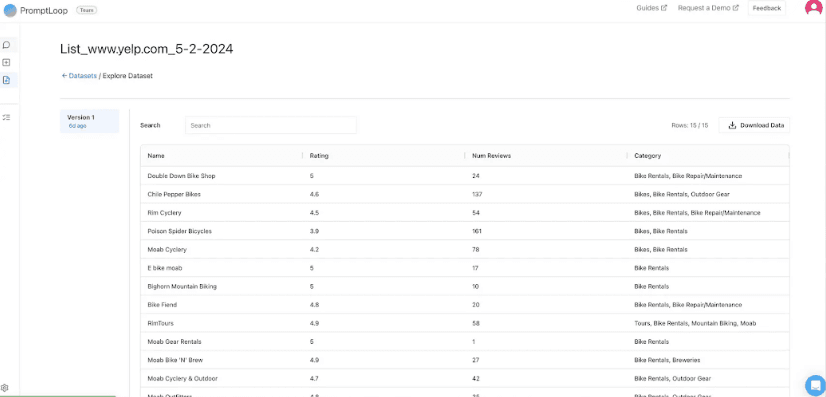
PromptLoop brings the power of AI directly into your spreadsheets.
As one of the best free AI tools for market research, it helps you automate insights inside Google Sheets without switching tools when working with structured data.
Key Features
- GPT formulas in Google Sheets
- Automates data labeling, summarization, and scoring
Use Cases
- Categorizing product reviews
- Scoring leads based on description
- Summarizing bulk data in sheets
- Tagging survey responses
- Running AI-powered segmentation
How to Use
Install the free PromptLoop add-on from the Google Workspace Marketplace. Once added, you can use formulas like =PROMPTLOOP(A2, “Categorize this review”) to process cells using AI.
For example:
- In a review sheet: =PROMPTLOOP(A2, “Is this review positive, neutral, or negative?”)
- For lead scoring: =PROMPTLOOP(B2, “Rate this lead from 1 to 5 based on readiness to buy”)
There's a row limit on the free plan, so prioritize analyzing high-impact data, like top-performing campaigns or customer pain points. Great for summarizing hundreds of entries quickly without leaving Sheets.
10. Crayon (Free Plan)
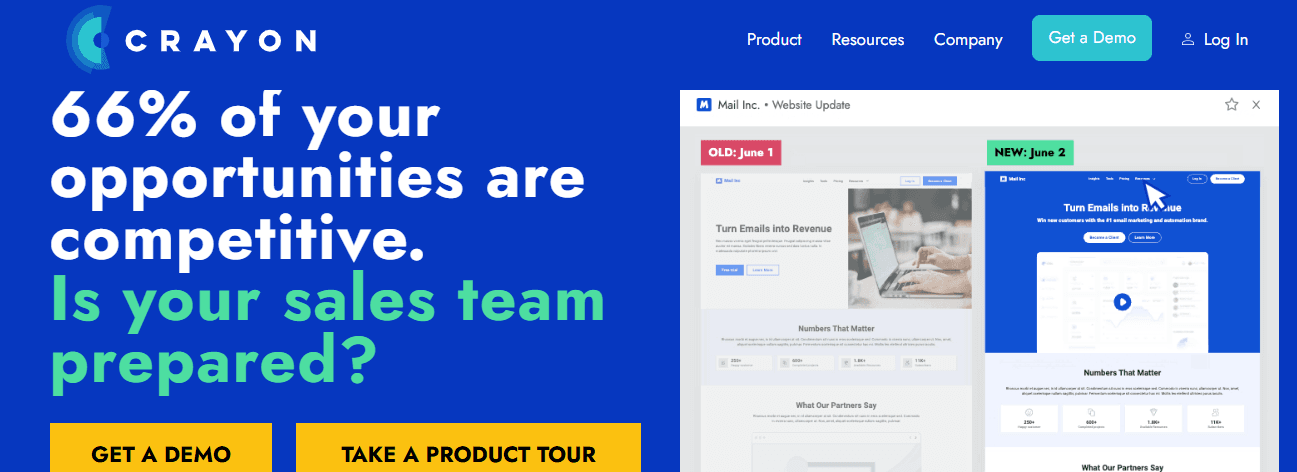
Crayon stands out among free market research AI tools by offering real-time competitor tracking without any heavy lifting.
It’s perfect for marketers who need to spot messaging shifts or product updates as they happen, making it one of the most practical free AI tools for market research.
Key Features
- Competitor tracking automation
- Monitors web pages, product launches, messaging
Use Cases
- Monitor how competitors change homepage copy
- Get alerts for new product features
- Detect pricing changes
- Compare positioning statements
- Spot design and UX trends
How to Use
Set up a free Crayon account and enter competitor URLs you want to track. Use the dashboard to monitor web copy, product updates, or design changes.
For example, set alerts for changes to a rival’s pricing page. Over time, you’ll spot key shifts in how they position themselves, helping you align your own strategy accordingly.
It’s a quiet but powerful player among free AI tools for market research that keeps your team one step ahead.
How to Pick the Right Free AI Tools for Market Research
When diving into market research, choosing the right tool can significantly affect your results.
The best free AI tools for market research streamline complex tasks and let you focus on what truly matters—insights. However, the sheer variety of options can make it overwhelming to pick the right one for your needs.
Understanding how each tool works and matching it to your specific use case is key to maximizing value. Here’s how to pair the right tool with the job, while considering collaboration, real-time functionality, and export flexibility.
Match Tool to Use Case
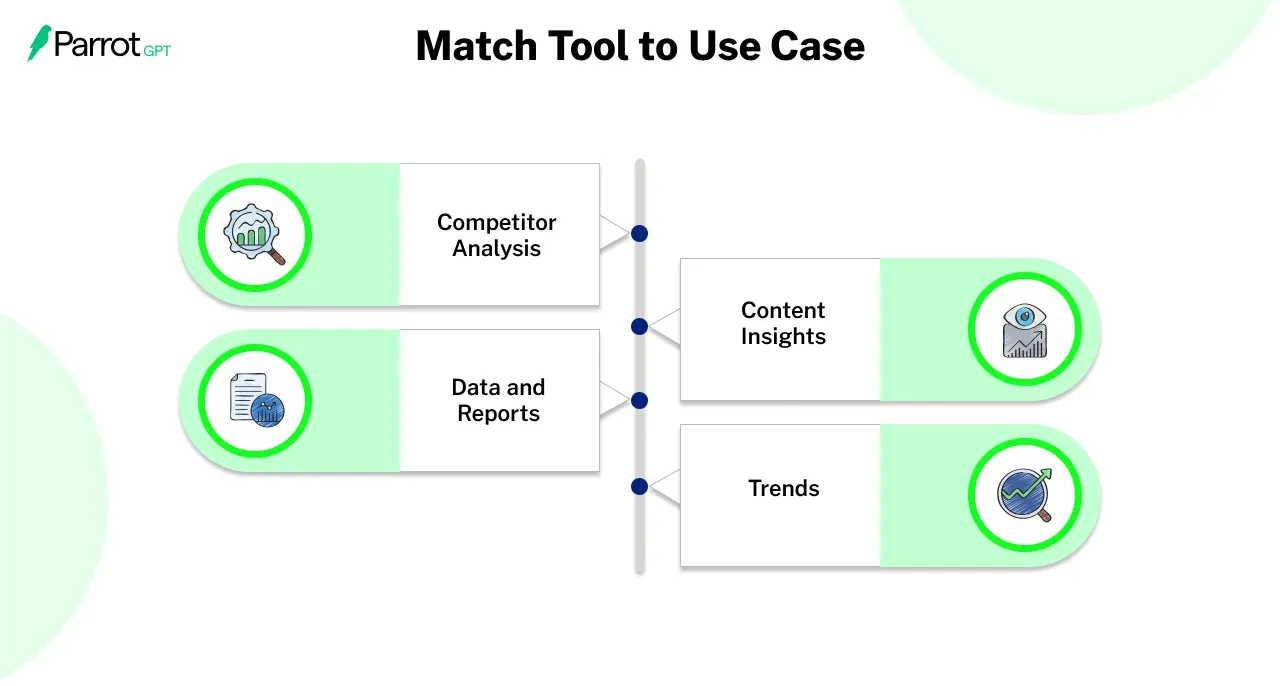
First, assess your primary market research needs. Are you looking for content insights, trends, competitor analysis, or data collection?
- Content Insights: If content is your focus, look for tools that specialize in identifying customer queries, topics, and gaps.
Tools like AnswerThePublic and AlsoAsked are ideal for mapping out what your target audience is searching for and building content around those insights.
- Trends: For tracking shifts in consumer behavior, Google Trends and Perplexity AI are great free market research AI tools.
These tools allow you to monitor the rise and fall of topics over time, ensuring you stay ahead of industry movements and spot demand surges early.
- Competitor Analysis: To track what competitors are doing, Crayon and Ubersuggest are effective choices.
These tools can help you track changes on competitor websites, identify new strategies, and uncover market gaps that you can leverage.
- Data and Reports: If you need to analyze large datasets or pull in market reports, PromptLoop for Google Sheets is a solid pick.
It automates data labeling and summarization directly within your sheets, making it easy to draw insights from bulk data without manual work.
Prioritize Collaboration and Export Needs
Team collaboration and reporting are crucial when working on market research. Look for tools that offer shared access and allow easy exporting of data.
- Collaboration: Tools like Notion AI allow for team collaboration, letting users draft reports, summaries, and brainstorm strategies all in one place.
If your team needs to work together on a project, consider using tools that support real-time collaboration.
- Export Options: Many tools, including Google Trends and Crayon, let you export visual charts and insights. This is incredibly useful when you're preparing reports or presentations for clients or stakeholders. Being able to seamlessly integrate data into your reports is a huge time-saver.
Don’t Overlook Real-Time Capabilities
In the fast-paced world of market research, real-time data is essential.
Real-time capabilities allow you to make decisions quickly and confidently. Tools like Google Bard and Perplexity AI provide live web data that keeps you up-to-date with the latest trends, customer feedback, and competitor moves.
This capability makes these tools indispensable when you need to respond swiftly to market changes.
Conclusion
Market research doesn't have to mean expensive tools or complicated workflows. This list has shown that the best free AI tools for market research can help you extract insights, track competitors, validate demand, and spot trends, without breaking the budget.
Whether you’re brainstorming content with Notion AI, mapping questions using AlsoAsked, or monitoring live trends via Perplexity AI, each tool offers value when matched to the right use case.
By combining the right tools with clear goals, you can turn scattered data into strategic insight.
Ready to try one? Start with a tool that fits your current needs—and build from there.
Frequently Asked Questions (FAQs)
What are the best free AI tools for market research in 2025?
Top free tools include ChatGPT, Google Bard, Perplexity AI, Google Trends, Ubersuggest, and Crayon.
Each supports different needs like competitor tracking, content planning, and trend analysis—ideal for marketers and small teams looking for actionable insights without paid subscriptions.
Can free AI tools really replace paid market research software?
Free AI tools can cover most essential research tasks like trend analysis, content ideas, and competitor insights.
While paid tools offer deeper features, free options are effective for early-stage strategy and small business needs.
Can small businesses use free AI tools for market research effectively?
Yes, free AI tools provide enough functionality for small businesses to gather insights, analyze trends, and track competitors.
When used strategically, they can rival the value of expensive research software.
Can AI tools replace human researchers?
Not entirely. AI speeds up data analysis and pattern recognition, but human interpretation is still essential for decision-making and strategy. Think of AI as a powerful assistant, not a replacement.
Are free AI market research tools accurate?
Yes, most tools use reliable sources or large language models trained on vast datasets. However, results should always be reviewed and contextualized with your specific market in mind.


